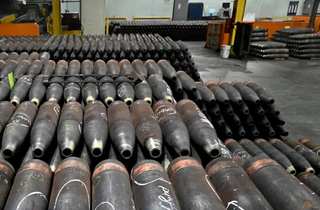In an interview published on Saturday, he urged European nations to significantly ramp up their arms production capabilities to support Ukraine and brace for "potentially decades of confrontation" with Russia.
With a crucial meeting of NATO defense ministers approaching on February 15th, coinciding with the second anniversary of the Russia-Ukraine war, Stoltenberg emphasized the dire need for increased arms production. He stressed the urgency of "reconstituting and expanding our industrial base faster" to meet Ukraine's mounting needs for weapons and ammunition, while simultaneously replenishing NATO's own depleted stocks. This, he said, requires a decisive shift from "slow peacetime" production to a "high-tempo conflict" footing.
Stoltenberg's warnings resonated with the growing chorus of pleas for Ukraine's beleaguered forces. The country's military desperately needs shells, ammunition, and other essential military equipment to sustain its struggle against the Russian offensive entering its third year. Western leaders, including US President Joe Biden and German Chancellor Olaf Scholz, have also joined the call for greater assistance, with Biden even stating that "the failure of the United States Congress in not supporting Ukraine is close to criminal neglect."
While acknowledging the absence of an immediate military threat to any NATO member, Stoltenberg cautioned against complacency. He highlighted the Kremlin's persistent rhetoric and threats directed at NATO countries, underscoring the importance of unwavering vigilance and collective defense.
The brutal reality of the Russia-Ukraine war, Stoltenberg stressed, serves as a stark reminder that European peace cannot be taken for granted. He emphasized the unwavering commitment to protecting all NATO members, asserting that "as long as we invest in our security and we stay united, we will continue to deter any aggression."
However, the possibility of a long-term confrontation with Russia looms large. "NATO does not seek war with Russia," Stoltenberg declared, "but we need to brace ourselves for potentially decades of confrontation." He elaborated on the alliance's close monitoring of Russia's actions and the ongoing reinforcement of NATO's eastern presence, aimed at deterring potential aggression.
Stoltenberg emphasized that supporting Ukraine militarily is not solely a moral imperative but also a strategic necessity. He believes that a Ukrainian defeat could embolden Russia and encourage further aggression elsewhere. Therefore, strengthening both Ukraine's capabilities and NATO's own defenses are seen as critical deterrents against future Russian expansionism.
As the crucial meeting of NATO defense ministers draws near, the world observes with anticipation. The decisions made regarding arms production, military assistance for Ukraine, and the overall strategic response to the ongoing conflict will undoubtedly have profound implications for the future of European security and the wider global order. (ILKHA)



 Güncel
Güncel
 Dünya
Dünya
 Dünya
Dünya
 Dünya
Dünya
 Dünya
Dünya
 Dünya
Dünya
 Güncel
Güncel
 Güncel
Güncel
 Dünya
Dünya
 Güncel
Güncel





